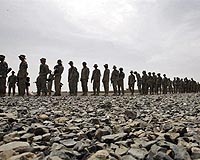| . |  |
. |
Washington (AFP) May 10, 2009 Pakistani President Asif Ali Zardari denied his nuclear-armed nation was on the verge of collapse as top US officials Sunday welcomed his government's bloody military offensive against the Taliban. "Is the state of Pakistan going to collapse?" Zardari said in an NBC interview aired Sunday, after White House talks last week with President Barack Obama that were also attended by Afghan President Hamid Karzai. "No. We are 180 million people. There the population is much, much more than the insurgents are," Zardari said, fending off a mounting clamor against his leadership from US lawmakers. Karzai had his own complaints to press as he lashed out at US air strikes after an attack last week that, his government said, killed up to 130 Afghan villagers including women and children. Obama's national security advisor, James Jones, said the United States would "redouble" efforts to limit civilian casualties but would not hamper its forces in Afghanistan by banning the air strikes. "We can't fight with one hand tied behind our back," General Jones said on ABC, arguing Karzai "understands that we have to have the full complement of our offensive military power when we need it." US regional commander General David Petraeus also took on board Karzai's bitter criticism about the impact on civilians, but said the "Taliban bears enormous blame" by firing on US troops from inside villagers' houses. The head of US Central Command noted that with the Taliban making deep inroads into Pakistan itself, there was now a "degree of unanimity" among Pakistan's civilian and military leaders that they had to fight back. "This is a Pakistani fight, a Pakistani battle, with elements that ... threaten the very existence of the Pakistani state," Petraeus said on Fox News Sunday. The military commander rejected US lawmakers' concerns over the security of Pakistan's nuclear arsenal in the face of the Taliban encroachments. "We have confidence in their security procedures and elements and believe that the security of those sites is adequate." Zardari admitted that Pakistan had "a problem" with the fundamentalist Taliban militia inside its borders and called for an international approach to extremism as a whole, "because it's not Pakistan-specific." "So I think the world needs to understand that this is the new challenge of the 21st century, and this is the new war." Pakistan's military said Sunday they had killed between 180 and 200 insurgents in the last 24 hours in their fierce offensive to push Taliban fighters out of the Swat valley in the country's northwest. The military has been pounding the Swat valley and nearby districts, triggering an exodus of refugees, after Taliban fighters advanced to within 100 kilometers (60 miles) of Islamabad despite a February peace deal. But with Zardari pressing for billions more in aid from the Obama administration, many US lawmakers remain skeptical of the Pakistani government and military. "There was just an air of smugness, flippancy when serious questions were asked," Republican Senator Bob Corker told CNN, looking back on a luncheon with Zardari, Karzai and members of Congress Thursday. While intensifying its political pressure on Pakistan, the Obama administration is increasing its military involvement in Afghanistan with more strikes on extremist targets and the deployment of 21,000 extra US troops. On NBC, Karzai said the reinforcements were arriving "late" but that "it's never too late for a good thing." The Afghan president complained, however, that US air strikes were alienating his shattered nation. "The Afghan people say we are fighting together with shoulder to shoulder against terrorism. That we are part of the struggle. Our homes, our villages are not places for terrorism," he said. Jones said that while US forces did not deliberately target civilians, the Taliban were "not playing by the same rules." "They're using civilians as shields," the national security advisor said. "So it's a difficult problem, but it's not unsolvable." Share This Article With Planet Earth
Related Links News From Across The Stans
 In Afghan 'desert of death,' a giant US military base emerges
In Afghan 'desert of death,' a giant US military base emergesCamp Leatherneck, Afghanistan (AFP) May 8, 2009 In the forbidding Afghan desert, US engineers are carving out a sprawling military camp as part of a dramatic American troop build-up designed to confront Taliban insurgents. The desolate plain in southern Helmand province that Afghans call the "desert of death" has turned into a hive of frenetic activity, underscoring President Barack Obama's decision to expand the US military commitment to ... read more |
|
| The content herein, unless otherwise known to be public domain, are Copyright 1995-2009 - SpaceDaily. AFP and UPI Wire Stories are copyright Agence France-Presse and United Press International. ESA Portal Reports are copyright European Space Agency. All NASA sourced material is public domain. Additional copyrights may apply in whole or part to other bona fide parties. Advertising does not imply endorsement,agreement or approval of any opinions, statements or information provided by SpaceDaily on any Web page published or hosted by SpaceDaily. Privacy Statement |